The insurgent accounts of witness
Jan Romanczyk "Łata" (= a patch) - the boy from "Miotła" (= a broom)
Further experiences
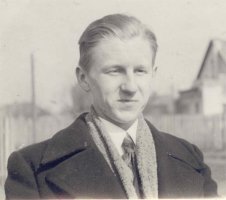 |
Jan Romanczyk
born on the 1st of May 1924 in Wolomin
sergeant cadet of Home Army
pseud. "Łukasz Łata" (= Lucas the Patch)
Kedyw of the Main Headquarters of Home Army
"Torpeda" (= a torpedo) Platoon, "Miotła" (= a broom) Battalion
"Radoslav" Grouping
|
The arrest
On the 10th of January 1949 to a multiple-occupancy room in a dormitory of the Association of War Veterans of the Polish Government in Cracow where I studied in the Academy of Mining and Smelting Engineering on the Smelting Department there came two unknown men. One of them asked: "Is there Mr. Romanczyk?" I answered it was me. The stranger took out a pistol and yelled: "Hands up!" A search was carried out and brought nothing. Men demanded that I should go with them. "You are suspected of smuggling hides from Czechoslovakia". I said I'd never been in Czechoslovakia. The undercover agent said: "We know it. But we've got a man that accuses you and we have to lead the confrontation."
In the prison I was requested to take out shoe-laces from shoes. The situation wasn't funny. Next day by an express train at 15:15 under escort of UB (= Polish Secret Service under Communism) worker I set off to Warsaw. To the station of Central Warsaw at Towarowa Street. We got there late at night. Nobody was waiting for us. UB-man didn't know the city. Excitedly he asked railwaymen how to get to Koszykowa Street. I proposed him to take a taxi, but the UB-man refused. We were walking solitary through the ruined and empty city. At Koszykowa Street the debris was lying at the first floor level.
I could kill my armed guard but it'd change nothing. I had had a wife and a child then. Besides I deluded myself that I fell victim to a mistake. Why should I look for additional problems?
In the Ministry of Public Security Service at Koszykowa 6 Street everything became obvious. There appeared Major Wiktor Herrer. The night questioning he started with words: "So what my son... you think you are innocent? You have to know that if we have to let you out after thirty days then this way or another you'll die near the fence on the thirty first day." He demanded I should plead guilty on the spot. I had nothing to plead guilty about, as the things having done before the disclosure were forgiven to me after the disclosure.
After questioning I was sent to the cell and located in a dog-kennel with a concrete floor, where one could neither sit down or lie down. It was the punishment I got from Major Wiktor Herrer as I didn't plead guilty. I was questioned many times what was aimed at threatening me and breaking me down. In the kennel I'd been sitting for 2 days, next day I was moved to the cell where there were Mr. Krak and Mr. German.
In the evening I was called out of the cell and in a jacket I was led onto the courtyard. It was frost outside, as it was January. I demanded a new, white spring coat in which I'd come to Cracow. I heard a mocking answer of the armed:" What do you need a spring coat for, you'll get a pine one in a moment." I was put in a car that drove ahead. Through the gaps in the tarpaulin I realized I was carried to the prison at Rakowiecka Street. We stopped behind the gate.
Rakowiecka
At Rakowiecka I got to the popular pavilion X- the pavilion of horror and death. There I was greeted in broken Polish by Major Serkowski. He asked me why they had arrested me. I answered that it was the hide smuggling from Czechoslovakia where I'd never been. Then he asked what organization I was from and when I repilied from Home Army he said:" Are you surprised they've captured you?" I realized that the Poland for which I fought wasn't for those like me.
I was led on the first floor and then to the thirty fifth cell in the pavilion X. Seeing me the sleepy prisoners got up, but I calmed them down introducing myself as a co-prisoner. After calm conversations quietness fell.
My first cell-mate was Franciszek Blazej from the IV WIN (= Freedom and Independence) police station, a pre-war time officer from Rzeszow-region. He was murdered in the prison at Rakowiecka. In the morning I made friends with my co-prisoners. One of them was Franciszek Blazej from the IV police station of Freedom and Independence Polish Army officer, the defender of Modlin, Home Army soldier in the regions of Rzeszow murdered in the prison at Rakowiecka in 1951 under the pretext of cooperation with Germans, it was that the sentence contained. Next, Janusz Oskierko-Jeznacki, a medicine student at Warsaw University, a gun collector. There was also Mr. Rekuc a teacher from Wroclav, a migrant from the east. In the cell there was also Mr. Nowicki, being in the course of questioning, little did he say about himself; Mr. Jaskolski, a sugar affair, a controversial one - people decorated by the President for a good job, some days later arrested and judged; Mr.Szuster - he was taciturn as well.
The life in the cell crawled from one meal to another. I started getting in touch with neighbouring cells by knocking on the wall using the Morse's alphabet. Next to ours there was women's cell. Knocking I learnt there was Cat-Mackievicz's daughter.
Out from the cell we were led to the questionings. The questionings were brutal. At all costs they tried to humiliate us and break us down. A proof for that was handing to us on the 1st of August the accusation act making out of us criminals and traitors of the Polish nation. I was carried to IB department.
After almost half-a-year stay in the prison, on the 1st of August 1949 the accusation act was read to me. On the 25th of August the trial started. It lasted four days. The defence attorney in the final word demanded release from prison seeing no basis for the punishment. From the article number 3 point b from the Decree on the 30th of October 1944 I was given a death sentence that on the strength of the amnesty from the 22nd of February 1947 was changed to a fifteen-year-long imprisonment - from the article 86 paragraph 1 & 2 of the Criminal Code of Polish Army (KKWP) for a life sentence and from article 4 paragraph 1 the Decree from the 13th of June 1946 for a fifteen-year-long imprisonment and the demotion to the rank of private. On the basis of the article 32 paragraph 1 and the article number 33 paragraph 1 & 3 KKWP (= the Criminal Code of Polish Army) they inflicted punishment on me that was a life sentence together with losing civil rights and the forfeiture of property in total.
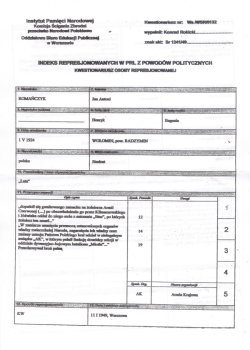
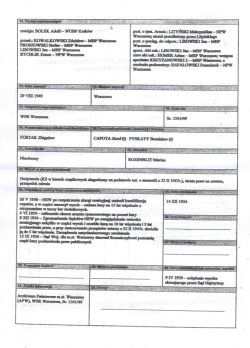
A questionnaire of a repressed person - the document of the Institute of National Remembrance
When the sentence was announced I was carried to the general department to the cell of 35 KS-men (= people with death sentences). In the cell there were: 45 prisoners with death sentences, about 50 with life sentences and about 15 with more lenient sentences. Before the war in the cell could stay 24 prisoners at best. Every few days after supper, the door opened and the ward read out somebody's surname. He who was read out got pale. In his eyes pupils disappeared, while eyeballs became white like milk. He left the cell as if absent. After some time the ward came back and took the useless then things.
Conditions were terrible. In the cell I met many interesting people, great patriots. There was also among others the Reverend Tuszynski, a head priest of the parish at Gdanska Street, a co-originator of the dormitory for orphans of the Warsaw Uprising Insurgents, a famous pilot Stanislaw Skalski and many other patriots from all over Poland.
In the cell number 35 there were soldiers of Warsaw AK and Vilnius AK, and Germans as well. Here was kept among other a Silesian-man Grzymek who in 1939 dressed up in a Polish uniform was among those who had attacked the radio station in Gliwice. One day in the cell appeared dr. Seibold, a German soldier who did time for war crimes. The first time I had a contact with him in the X pavilion. I spoke German to him for what I was reprimanded by the ward. Seibolt remembered me. He came close to me and we started talking. Before he was carried to the 35 cell he had been assisting during the death sentence carrying out. One day he told me what it'd been like. Dr. Seibolt took part in all of them, as he was a doctor declaring death. My interlocutor didn't expect he would be allowed to the general cell. I don't know what happened to him next.
The execution was carried out by a functionary Szymanski, widely called by the prisoners "general the stench." The called out from the cell was led to the prison warden, where there had already been a public prosecutor and a defence attorney. The prison warden informed the condemned person the sentence was approved while President Bierut didn't grant a presidential pardon. The guards took the poor wretch linking their arms through his and led him in the direction of a small house behind the X pavilion. When the condemned person was led to the door, Szymanski, a warden of the X pavilion, took out a 11,4 calibre Colt gun and shot at the back of the victim's head. The paralysed body opened the door, got inside where there was a floor poured with a thick layer of sand. Then dr. Seibolt got inside and declared death. In the morning the body was taken into an unknown direction.
I was carried to another cell and was made a cell-representative but I didn't stay there long, as they carried me to another cell for me having criticized the leader. In the new cell I was received cordially, there were lots of friends. When everyone greeted me, there came close to me an elderly man and asked me where I was from. When I answered that from Warsaw he said he had a family of the same surname in Warsaw. I asked where. When he said at Zurawia 30 Street I asked about his surname. It turned out that it was Viktor Bernard my relative from my grandmother's side. His mother and my grandmother they were natural sisters. Uncle all war long sailed in British convoys as a navigation officer. After the war he came to the country and found himself in a prison - a Polish kind of fortune. In the cell I met the Reverend Zator-Przetocky coming from Lwow, a very great patriot.
In Mokotow prison I got a verdict of an appeal of my case and I learnt that the article number 4 dropped off. The article number 68 KK WP (the Criminal Code of Polish Army) was changed into the article number 28 in connection with 86 and the sentence from that article was decreased for the 10-year-long imprisonment making it lenient on the basis of the amnesty from 1947 for the punishment of a five-year-old imprisonment. The punishment from the article 3 from the Decree of Nation Security stayed in force and I got in total a punishment of a 15-year-long imprisonment. With that punishment I was taken to the penal prison in Wronki.
Wronki
In January 1951, together with other prisoners, I found myself in Wronki. We got there at twilight, we were arranged in a column and warned that for every attempt of leaving the column they'd shoot. As it was dark they led us into the building. During transports, that arrived on the day, regardless of the year season and the weather, the prisoners were undressed naked and searched on the courtyard. We were standing and waiting for our turn of search.
A ward came to me and took me for searching. In hushed tones he said to me: "I'll scream, but you don't care about it only take your underwear on, tied up well the blanket with clothes and mind you would be hit the least." I winked at him in confirmation and behaved according to the given instruction. The blows happened nevertheless. One prisoner dropped his blanket with things on the stairs, I had to slow down, while the ward thug caught me and hit with a key. In spite of the underwear I wore he hurt me that there was blood.
We were located in the I c department. It was the department for the most dangerous enemies of Polish People's Republic. Next day we acquainted ourselves with prison habits. In Wronki we subscribed to newspapers, "People's Tribune" of course. We received it for two days and never again later on. When in a few days' time the prison governor visited us, we asked him a question why we didn't get the subscribed newspapers. The prison governor said we didn't get newspapers because we read them between lines.
The prison governor asked: "What are you waiting for? You think that Americans will go out from the forest and will liberate you. Be sure, that the prison governors will die and so will I but none of you won't go out alive."
The only pleasure for us was receiving letters. A letter was the only means of contact with freedom. We got one letter a month. We could also write one letter a month.
A sad letter was sent to me in May 1951. I learnt from it about my mum's death. She died as a result of haemorrhage when she had learnt about me being transported to the prison in Wronki. Being engaged herself in the underground movement she felt that a great harm had been done to me.
The cell life was monotonous. We didn't get newspapers. Instead of books we got a few-page brochures like: Popow invented the radio, Jabloczkin invented the bulb etc. We organized somehow the cell life by eg. talking about our experiences. In the same cell there was a forestry engineer, there was an editor from Warsaw, me, a student from the Academy of Mining and Smelting Engineering in Cracow, tow young people who yearned for gaining some knowledge. The editor talked about Polish, literature and history. The forestry engineer told about a forest life, biology, chemistry and physics. I had the honour of telling about algebra, trigonometry, geometry and physics. The problem was with writing materials that couldn't be possessed in the cell. We had to deal with it somehow. I got cloths. The stiffer ones we took for boards, the soft ones we burnt down to get ashes and mix them with lard. We spread it on stiff little cloths and black cloths we sprinkled with a tooth-powder and with a match we could write on them. This way the young made use of our knowledge till the time of the transportation, as from time to time the personal state in the cells was changed.
A visit behind bars was a pleasure. Wife got once a permission for visiting me together with a little daughter, that took place in different conditions in a separate room. At a table wife sat at one side, me at the other side and the ward beside. It was allowed that my five-year-old little daughter Marteczka (= tiny Martha) would sit on my lap. A very unpleasant incident ensued, especially for the child, as we the elder we realized the politeness level of those gentlemen. The child sitting on the lap of her daddy took out from a small pocket a candy and wanted to treat me to it. The ward suddenly got up from his seat and grabbed the candy from the child's hand. The child was terrified. Tiny Martha hugged me close and I whispered to her tiny ear - don't cry.
The conditions were awful, persecutions at every turn. When the cell door opened, we had to stand with our backs to the door near the window. It happened that I was punished with a week of hunger, as I had a tiny knife for trimming nails made from metal sheet. I had done it in Mokotow prison. It survived many searches. Using the tiny knife I didn't put it in the hiding place but in the pocket of a prison blouse that was put on the corridor for the night. The next day in the morning there was a search and the tiny knife was found. It was a pretext for punishing me. Soon I went down with tuberculosis of the lymphatic glands. In Wronki there was a ward for lung TB patients, lots of them "took a ride" for the other world. I got to the hospital. When I was admitted there I weighed 48 kilos.
After six weeks when I made a partial recovery and I was discharged from hospital I weighed 60 kilos. My health improvement I owed to the doctor-prisoner Jan Pierzchala and a druggist-prisoner from the prison drug-store Kazimierz Augustowski, Home Army soldier, a Warsaw insurgent from Czata (=a watch) 49 Battalion.
Leaving the hospital I was directed to the quarantine as I had to heal wounds after the operations performed in the hospital. After a total wounds healing I got back to the department. At the department I was questioned by special officers (political ones). My answers didn't please one of the officers questioning me, as for the good by he said: "You motherfu..., never will you go out of the prison." Let it be, I preferred to be a man. Not all functionaries were scoundrels. There were also among them those who warned me against snitches (a snitch was he who denounced the prisoners to the authorities to the detriment of the former).
One day the cell door opened and a ward came in that wasn't from our department and he brought to me a letter from home. I knew that ward as he served very often in our department. I got happy very much as the letter was with a photograph of wife and my little daughter and because I'd received a letter from the ward who wasn't from our department I didn't have to give the photo back to the magazine, but I'd prepared a hiding place in the little missal (a little book for prayers) and I looked into it every time I was very sad. We weren't allowed to keep photos.
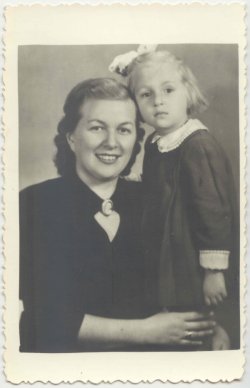
My wife Zofia with a little daughter Martusia ([tiny Martha)
One of the wards called me in from the cell and asked if I wanted to work on the corridor. I agreed as I needed some physical exercise. This ward when on duty always let me out from the cell. After some lettings out he said he would try to bring about a situation that I could be on the corridor all the time. I advised him against it as it was connected with a visit at a special officer. He got what he wanted and took me to the "boffin" as we called the political officer. He asked me about personal data, and then why I did time. When I said: "Because I fought for Mother Land," he started screaming: "Put that motherfu... in the cell." The ward came and led me to the cell. On the way he asked:" Why did he scream so much?" I said to the ward what I'd said to the "boffin" and he answered: "Don't worry if I am at the department I'll always let you out."
The day of the 28th of August 1953 came. Unexpectedly we got newspapers with a piece of news about a hostile attitude of Beria the comrade. On the 29th of August of 1953 I wrote an official letter to the Supreme Court concerning my case. I was informed the letter was officially sent to the Supreme Court and then the quietness fell. At the end of October of 1953 three prisoners were prepared for the transportation. It was: Zygmunt Ziemiecki pseud. "Galazka" (= a little sprig), Tadeusz Janicki pseud. "Czarny" (= black) and Jan Romanczyk pseud. "Łata" (= a patch). All from "Miotla" Battalion.
Cuffed we were led to the train station in Wronki and put in the reserved compartment of the train to Warsaw in the company of KBW (= Internal Security Corps) patrol made of: a platoon sergeant - the platoon commanding officer and two privates. Additionally we were accompanied by an officer from the prison service. We moved on. People on the corridor were looking at the transported criminals. We weren't allowed to communicate with one another. In the worst situation was a friend Janicki, as he was sitting in the middle and his two hands were cuffed. We, three, we were from "Miotła", from the Warsaw Uprising.
When the officer and the commanding officer of the platoon went for a smoke on the corridor, we started talking with one another, so that those from the corridor didn't hear. Young soldiers that stayed in the compartment didn't reprimand us though they realized who we were. We got to Warsaw, we started preparing for going out. Young people put Russian automatic pistols on their arms and said: "Allow us to take your luggage." With content we accepted the impulse of the young soldiers, while their commanding officers would have killed them with eyes if they could have done it. I looked into the eyes of one of the young people and thanked him with eyes, probably he understood what I wanted to convey.
In front of the station there was a prison-van waiting for us, that took us to the prison at Rakowiecka Street. Here we were led to the I b department where I'd been earlier from the moment of reading out the accusation act to the moment of announcing the sentence. The ward appeared that was at the department when I was there almost three years ago. He looked at me, recognized me asked: "Again?" I answered: "Still." He understood, his face became sombre.
We were locked up in one cell. Seeing the reaction of the ward I decided to make use of it. I knocked off the lid it was a sign the ward had come. After a while the ward appeared. Then I started talking I had already come from Wronki. I expected that my wife would go there in that time for a visit. She lived there in Warsaw I'd like to give her a sign as fast as possible that I was there. She's poor and I wouldn't like to expose her to unnecessary costs. The ward Jedynak as it was his surname ordered me to report tomorrow morning.
It was a Tuesday morning, I got a piece of paper, an envelope and I wrote a letter to wife. I was very grateful to the ward as wife came for a visit on Thursday and said she got my letter bluepenciled with a post stamp. Satisfied she said that she'd written a request for grace to the President and that I'd be released for sure.
I tried to cool down her hopes as I didn't expect anything good from that rascal. I said to her I was sustaining my opinion from our meeting in August 1952 that I wouldn't get out earlier than in two years' time though I wouldn't stay longer than three years.
The reason for our coming to Warsaw was Colonel Radoslaw's case, we were used as witnesses. During the trial they demanded from me evidence on my meeting with Colonel Radoslaw. The judge not satisfied with my answers read out a text from a protocol of supposedly my evidence telling about secret meetings with Colonel Radoslaw. I said: "I know where weren't such meetings and I didn't take part in them." The judge asked whether I'd read that protocol. I denied and said that the protocol had been read by an investigator and given to me for signing. It wasn't seemly to accuse him of dishonesty. I asked the judge to read a piece of the text before the cited extract and after the cited one. Those extracts constituted a logical whole while the cited fragment was a piece that didn't match the evidence. I asked for deleting that text and for minuting that fact in the files of the case.
The general prosecutor Zarakowski accusing Colonel "Radoslaw" said a word: "Your Honour, the witness is making a fool of us, as everyone knows that Radoslaw joined the underground movement the aim of which was to overthrow the political system." After that statement I took the floor: "Your Honour, I am not sure who's making a fool of us here. I have been doing time for over four years and up to now they didn't prove my belonging to the organization the aim of which was to overthrow the system." After my statement the defence attorney of Colonel "Radoslaw" clapped his hands under the table. The judge asked the prosecutor whether he had anything to say. The prosecutor denied. This way my testimony ended.
We were moved to the general department. I got to the cell number 35 where I'd done time after the verdict of the court of the first instance, four years ago. The cell changed beyond recognition. The floor was made of nice boards, cleaned with wooden chips by prisoners. Instead of pallets there were bunks with pallets, there were no vermin. There were less prisoners in the cell. The conditions improved.
I am sure it was the time when I met with Gracjan Frog pseud. "Szczerbiec" (= a coronation sword of Polish kings) from Wilno Region, though the documents report he was murdered in the prison in Mokotow in 1951. My observations were based on the fact that "Szczerbiec" did palm readings to me. This I remembered contradicted this that he'd been murdered in 1951. He said that I'd lost a very close person and soon I would lose another close one. There was written on the palm I'd leave the prison soon. I knew that on the 21st of February 1951 mum had died. In the meantime I didn't have any contact with "Szczerbiec" but later in Mokotow, in November 1953. I went out of the prison on the 14th of December 1954 while on the 11th of November 1956 my wife died. It was my second loss, that had been foretold by "Szczerbiec" in November 1953.
In January 1954 I got to Wronki again. The greeting wasn't so much brutal. In April wife informed me that she'd received a negative answer to the request to the President. The same answer I got in June. In the meantime I was woken up one day, ordered to take clothes on and led for the questioning. The investigator introduced himself as a prosecutor of the General Prosecutor's Office. At the beginning he asked me for personal data and then why I did time. When I said that for the belonging to Home Army he got very indignant and said: "We don't put anyone away for the belonging to Home Army." I said: "Maybe you'll find another version, I'll tell you mine. When I was captured and carried to the prison in Mokotow to the pavilion X I was received by Major Serkowski that you know very well. He asked me what organization I'd belonged to. When I said to Home Army he said I shouldn't be surprised why I did time. Now you can tell me your version."
Sir Prosecutor got silent and we started questioning. I was asked about two people from the Ursus area: Sir Doctor Jerzy Wloczewski and a primary school teacher in Ursus Edmund Pokrzywa. I said they were the best Poles I'd ever met. Then the questioning ended.
One day a ward came to the cell with a prisoner and they asked about Romanczyk. When I said it was me they said that the prison governor acceded to my request. I said I hadn't asked the prison governor for anything. Then they ordered me to think about it carefully. I remembered when over three years ago I came to Wronki in 1951 I had asked the prison governor for the right of using books on engineering. Just to that request in September 1954 the prison governor acceded. I asked them what they could offer me in Polish. They answered nothing, as everything had been taken by those who were on duty. For me they had "Learning the cutting" by Reznicow in Russian. I asked whether I could get a Russian-Polish dictionary, they nodded. So I agreed, I had something to do, and I wasn't idle. I mastered Russian so well that looking at a Russian text I read it Polish.
News got to us that our files had been declassified and we could look at them. I made use of this opportunity. The most interesting thing for me was the protocol from my first trial, where the doctor had demanded an excuse as he didn't see any reasons for punishment and this that happened to the letter from the 29th of August 1953 that was sent to the District Martial Court, and there it got stuck. I looked into other things, but they didn't interest me.
One day to the cell there came two prison functionaries and said that if anyone had any reservations about the verdict one should write about it. Then I laughed to what they reacted harshly. I said to them that on the 29th of August 1953 I had written to the Supreme Court and I hadn't got any answer up to this time, and probably my letter landed in the dustbin. They said they'd fix the matter for sure I'd get an answer and they went out. In two days' time they appeared with a letter from June about the answer to the grace and they accused me of untruth. I said to them it was an answer for the request for grace that my wife had written. I wanted an answer to my letter and not a grace. I want justice. They assured me they'd fix the answer and got out.
In October 1954, in a letter my wife wrote that six months passed since the President's answer and so she could write again, but it would be better if I wrote it me myself personally. In a letter to wife I answered that I had no reasons for writing as I hadn't committed any crime and I hadn't pled guilty. If she wanted to help me she should go to the District Martial Court and learn what had happened with my letter I'd written on the 29th of August 1953.
On the 13th of December 1954 after dinner I was ordered to take things and the pallet from the cell. I was led to the department number IV to a single cell. I was confused what it meant as there were four pallets in the cell. At that department the garbage man (a prisoner dealing with rubbish) was my friend prisoner, who led Rydz-Smigly through Tatra mountains. He came close to my door and said that prisoners from that cell were released. I slept restlessly the night as I was curious about the next day.
On the 14th of December 1954 after breakfast in the morning I was led out of the cell. On the corridor there had already been three prisoners. We were formed in ranks and led to the administration space. In pairs we were put into two rooms, not very spacious ones, next to one another. Then one prisoner from the neighbouring room was taken. After some time he got back and my friend was taken. The tiny wall between the rooms was thin and we could contact with each other. I learnt that a friend behind the wall received a convalescent leave and was released. And so my friend got back as well, and the second one was taken from another room. My friend received a conditional release. The second friend came from that room and I was taken.
I was taken to the administration, my personal data was checked, and a ruling of the Assembly of the Supreme Martial Court Judges was read out: the punishment from the 32nd article was dismissed in connection with the article 86 of KK WP (= the Criminal Code of Polish Army). The death sentence from the 3rd article point "b" from the Decree on the Country Security in 1944 decreased to a ten-year-long imprisonment, the amnesty was granted from the year 1947 and a sentence of a five-year-long imprisonment was passed. Because I served six years, the judge announced an instant release from the prison.
The verdict was received by me with no special response. He who was reading it thought that I didn't understand it and read it again. When I assured him I'd understood he asked me why I wasn't glad. I answered that when I'd received a death sentence I hadn't cried so now when I had six years of a wasted life I was to be glad. He looked at me and said:" It's true."
I was led to friends, then to the clothes magazine and here the clothes for the release, to people, were prepared for us. I thought that soon I'd be home and they would receive me after such a long time of absence. I guessed that the release was the result of my letter, as wife had done the way I'd asked her to. Does she know I'll be home tomorrow morning?
When we left the magazine with our things, the wards who had carried out searches of us were excited as well. They had been with us for some of years, some of them were humans, but not everyone. After the search we were led near the office, to collect documents and some money that in succession was sent to me by my wife for the so-called "discharge." Once a month one could buy for it products from the prison canteen. I hoped it'd be enough for the journey. Waiting on the corridor near the office I saw an officer who had carried out conversations with me. When he saw me in clothes he asked where I was going. When I said that I was going home he said: "I would expect death more than this that you would leave that place." I said: "I have nothing against it you can still expect it."
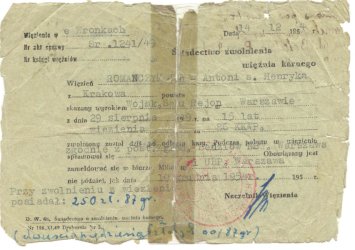
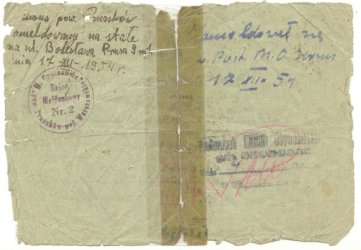
A prison release confirmation
A return home
We received documents and money and with wards went to the train station in Wronki. The ward bought the tickets and we were waiting for the trains. I was going to Warsaw, while friends in the direction of Szczecin. When they got on the train the ward said: "Don't get back," and when I got on my train he said: "Never come back." The train departed. I started looking for a place. I looked into the compartments of the Pullman's carriage (= a long train with corridors leading to individual compartments), but all places were taken. In one compartment one lady said :"Please wait, I'm getting off now, the place will be free." I was glad, as the place was near the window.
When the lady got out I took the free seat. My clothes revealed this who I was. I had a bald head, having my hair shaved, my hat had got lost, in my hand there was a fabric little bag in the prison language known as "samarka." A man who was sitting opposite looked at me and asked: "For long?" I answered: "Six years." The man nodded and said: "Nothing changed." The train, stopping at the stations, was rushing to Warsaw. I was excited waiting for the moment of me seeing with my family. The train stopped at the final station of East Warsaw. I was there. In half an hour I'll be home. Do they know I'm coming back? How will they receive me? What impression will I make on my little daughter?
I set off on foot as it wasn't far. I was going along the streets of Kijowska, Brzeska, Markowska, Zabkowska, Radzyminska, Folwarczna. Then through a not-built-up little square and here I was at Grodzienska 10 Street that was my destination. I knocked on the closed gate, an old bitch Miska ran up. Probably she recognized me as she dashed onto the corridor and started barking. She barked at strangers in the gate. It was a very early morning. Miska with her barking gave a riddle to the housemates, as no relatives in the morning would come like that. My mother-in-law and Miska came to open the gate. I didn't expect the dog would receive me that way after six years. She was fawning on me, licking my hands.
We entered the parents-in-law's ground floor. I greeted with a father -in-law and the cousin of parents-of-law, and then I went upstairs to wife and daughter. The confusion was enormous, as it turned out they knew nothing about my return. My wife, as I'd written in the letter, went to the application register of the District Martial Court. Here she learnt that my letter had laid up to that time and only because of my wife's intervention it was sent to the Supreme Martial Court and that she should get from there any further information. When after a week she came to the Supreme Court they said that the letter had just arrived on Wednesday, and that she should ask about it in two weeks' time. Something cropped up to her and she couldn't learn about my future then. She promised to herself she'd go next week, but I'd been already home on Wednesday.
My return retrieved the order of the day duties of my family. My wife went to work so as to get a day off on the occasion of her husband's return. My little daughter excited went to the kindergarten. I went to the administration to register. I learnt that the registering lady was unable to do it and I had to report to the Citizen's Militia. I got back home and went to the kindergarten to collect my little daughter. My first task was to visit the grave of my mum whose death reason was my imprisonment and the announced sentence.
Having eaten the dinner we went together with wife to the cemetery to Kobylka. It was getting dark, my wife got shivers thinking about entering the area of the cemetery. I said: "Don't be afraid. The dead won't hurt you, look out for the alive." We went onto the cemetery, in my soul I talked with mum. There where she was buried, there was also my mum's brother with wife, and opposite there was a grandmother buried. Having visited the cemetery we went to Wolomin to visit a family from my mum's side. There was my godmother, it was a very nice meeting after so many years.
When we came back home we were visited by my wife's uncle who proposed we should meet eye to eye. I couldn't agree to it. I thought that all details I should learn from my wife and we could meet together. Having drunk tea uncle went home. This way the first day of my freedom ended. Sleeping in my own bed was awaiting me. The night passed quietly.
The second day of freedom began that I started with a visit to the station of the Citizen's Militia at Wilenska Street. A duty officer was surprised that I came to him. Then I showed him my document of the release from the prison where was written that having come back home my duty was to report to the station to the Citizen's Militia. He answered me then that first I had to register in that place. The registering-lady seeing the urge of authorities to separate the family, being unwilling to take part in the procedure she showed secretly to me a document where I read that people like me couldn't be registered.
I understood the duplicity of the authorities. I went to the Citizen's Militia station, there were sitting three policemen. I said to them: "Arrest me" and gave them my hands to be cuffed. Then I said that if they didn't allow me to come back to my family then they should capture me. In the room one policeman stayed, the rest went out. He started talking with me and explaining that it wasn't their regulation but it came from higher levels. Those who came back from the prison were to report in those places where they'd been registered for permanent residency before the arrest. In such a situation I didn't have a right to live with the closest family.
My mother died, my father lived with an unknown woman. Would he like to register me? I'm to be far away from my family, what is it? Then the policeman said: "If you register there then you'll write an application for a temporary residency at a family and you'll get it." Because I cared about normalizing the documents as it was necessary for getting a job I took the policeman's advice being aware of a hostile behaviour of the authorities towards me.
Going to Ursus I dropped in on the uncle, my godfather, living in Warsaw at Nowogrodzka 6 Street. The meeting was cordial, the uncle supported me with a 500zloty sum, saying that at the beginning it would be useful to me. Then I set off to Ursus. A meeting with father, his wife and hosts of the house, the Sobocinskis, was very pleasant. On the day I fixed the issue of registering.
Getting back home I stopped at Sierakowski Street for the Office of Public Security to fulfil the requirement of being registered there. I handed my card of the release from the prison to the officer on duty and was waiting. The officer on duty phoned the office and was talking with somebody. Finally he called me and said:" Nobody wants to talk with you, go away from here." I claimed the confirmation I'd been there. He said I had the police station confirmation that would do and even more insistently he was chasing me away.
Having got back home I was visited by my friend Jurek Pietrzyk. He told me he would help me if I looked for a job as he worked in a design office that was in the modernization of the foundry in Ursus. Jurek knew I worked in the foundry so that it would interest me, while the office director was a very decent gentleman engineer Stefanski. I welcame Jurek's proposition and went for an interview to engineer Stefanski.
It turned out that the knowledge of Russian I had gained during the last stay in prison was very helpful, as there was a problem with Russian language in the office while I'd mastered it well. To take up the job I had to wait for the permission of some elements. I took up the job on the 19th of January 1955.
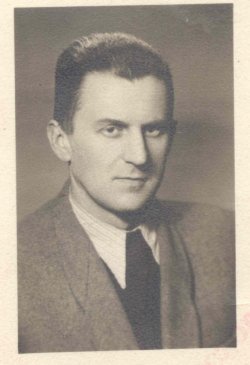
Jan Romanczyk after leaving the prison in 1955
During my job hunt to my wife a policeman came with an accusation that she detained a not-registered man. Wife got irritated and started reminding him that husband had got back after many years while they didn't want to register him and she was intruded on by them. The policeman feeling uneasy started apologizing my wife as he knew nothing about this he was to set upon her and he went away.
I submitted an application for an ID card. My document was a temporary identity card. The time had come for setting down the issue of a temporary register. I got a register for three months and every three months I had to renew it. One friend of mine who met me asked me if I had fixed for myself the matter of a war-disablement. I said that I hadn't as I didn't have the civil rights. Then my friend said it didn't matter and I should set it as fast as possible. In fact I got the III-rd group of war disablement. I got a summons to the Commission of Military Completion and on the 18th of April 1955 I got a service papers with the rank of a private.
After some time I went to learn about my ID card. I learnt I wouldn't get an ID as I wasn't registered anywhere for a permanent residency. My wife she went to the Census Bureau to ask for a permanent residency register as she didn't want to have husband for the time being.
In August 1956 finally I got registered permanently with my family. My wife wasn't healthy and very often she had liver attacks. On the 6th of November 1956 she had a severe attack that the visits of the doctor from a clinic and from an emergency ambulance service didn't help. On the 10th of November 1956 I called the doctor in private. The doctor didn't come but only on the 11th of November in the morning. He realized what was going on and gave a referral to hospital. He ordered to call the emergency ambulance service on the spot and he said to me that it was a very serious case. I drove with wife to hospital. The doctor that received us asked for the permission for operation.
We agreed and wife was taken to the hospital. It was twelve o'clock. I went home, there stayed my little daughter. At 16.00 parents-in-law me and my little daughter we went for a visit. During the visit wife was being prepared for the operation. When the visit finished wife was taken for the operation. Family went home and I was waiting near the operating theatre. The operation lasted very long, when finally they took away the unconscious wife I went home.
In the morning I sneaked imperceptibly to the ward. Some lady came to me and said my wife was dead. I was weak at the knees when I heard this news. What will I do with the child by myself? I have had no mother yet. Who will help me? How will the child receive the loss of mother? When I was thinking that way a lady came to me and said that in a moment my wife would be taken away. From the corridor a trolley with the body covered drove out. I came to it, drew slightly the sheet aside and I saw wife. I felt a pang of regret in my heart. I felt a pang in my heart, with regret I saw my wife off to the morgue, there I stood by her and thought: "Why did you leave me?" I returned to the ward to learn something from the doctor.
The doctor said there had been a necrosis of the pancreas regularly poisoned by bile. There was no hope for it. The doctor sympathized with me very much. I went home to share this sad news with household members. I had to think about the funeral. One had to bury her with due respect as a Home Army soldier. U sing her war-disabled person card, in the garrison I obtained a permission to bury her at the Soldierly Cemetery at Powazki. Then I obtained a permission for burying her at the plot of "Miotła" A-24. The funeral was held duly. In the funeral a priest from the basilica at Kaweczynska Street (our parish) took part and so absolutely did the priest for the garrison church. The funeral was conducted by the priest from the Basilica.
Life went on. To guarantee a protection for my little daughter I was forced to get married again. On the 8th of June 1957 I got married with a woman that was 12 years my junior.
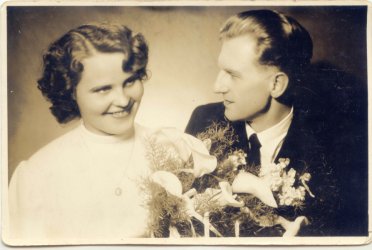
Teresa and Jan the Romanczyks, 8th June 1957.
Third from the left Jan Romanczyk
I served almost six years of the life sentence ordered by the first instance. I went out from the prison in December 1954. I was thirty years old then. In April 1959 by the Supreme Court verdict I was cleared of the accusation, but still during the times of the communist reign I was kept under surveillance as all the time I was a dangerous second-rate citizen.
The epilogue
Another years passed by.
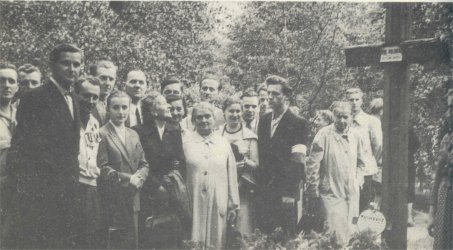
A group of soldiers from "Miotła" at the grave of the commanding officer Major "Niebora" 1956.
Third from the left Jan Romanczyk
The political life in the country had started changing so much that I thought about carrying out my case fully. I wrote a letter to the General Prosecutor's Office to examine my case. I received a negative answer. I turned to Colonel Radoslaw for help in that case. Colonel Radoslaw recommended to me Lis-Olszewski, the barrister. Paying the barrister for the stamps of the formal letters I received a notice from the Supreme Court President that he would personally present my case during the session. The Supreme Court in Warsaw in the Criminal Chamber secret meeting on the 9th of April 1959 issued a verdict on the behalf of the Polish People's Republic, that cleared me of the accusation and the punishment while the State Treasury was charged for the criminal proceedings.
During the trial for the compensation in September 1959 the court granted to me a sum of 70,000 zloty. In the commentary on the verdict the judge said that neither the sum I'd demanded nor the sum granted by the Court was able to compensate the injustice I had suffered, while the adjudged sum could be received like an aid to setting into the current reality.
In the appeal trial the Supreme Court rejected my appeal and the public prosecutor appeal and approved the first instance verdict. I received money on the 29th of January 1960. Friends attracted my attention to the fact that as I was taking the war-disabled person pension I should get a compensation for the period when I hadn't received the pension. As a result of my application they paid me out the unpaid benefit, but in 1960 they deprived me illegally of the war-disabled person rights, as it was a country of the anarchy.
I got a notice from WKU (= the Commission of Military Completion) to deliver the right documents as there was a proposal for me of a promotion to second-lieutenant. I answered my documents were in UB (= the Office of National Security) and there they should apply. The war-disabled person rights I regained in 1976.
Not all people were spiteful. I owe much to the Director of the Ursus Company, Mr. Zygmunt Purzycki, as thanked to his conduct I received a flat. In spite of the popular power reluctance I decided to finish this that had been interrupted by the arrest in 1949. Having overcome the difficulties in 1973 I received my engineering degree at Warsaw Technical University on evening studies. I was working in Prodlew office design.
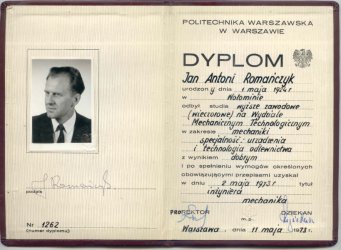
Jan Romanczyk's engineering degree
In 1980 during the protests of workers the crew chose me, accepting Mr. Tadeusz Wyszynski's proposal, Cardinal's stepbrother, for the chairman of the Founding Committee of NSSZ "Solidarnosc" (= Independent Self-Governing Trade Union) in our company. At the end of the eighties and at the beginning of nineties friends from the Milieu of Home Army Soldiers "Radoslaw" Grouping "Miotła" Battalion chose me for the chairperson of the Milieu.
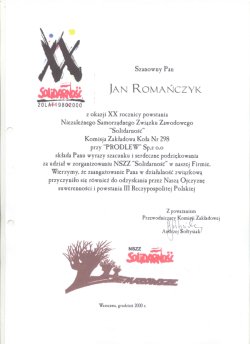
A memorial diploma
On the 13th of December 1981 the authority decided to discontinue the formation of Solidarity and announced the State of War in the country, arresting active members of the Association introducing terror. As a result of such circumstances, having opportunities I decided to retire. Being a war-disabled person I got a war-disabled person pension and a regular pension what gave me quite a high benefit. I decided to rest.
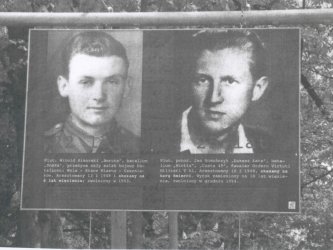
A photograph from the display on the fence of Ujazdowski Garden
I started the Warsaw Uprising in 1944 in the rank of corporal officer cadet. In the middle of August when I was stationed at Mlawska Street I learnt about the promotion for the rank of platoon sergeant and about the order of the Cross of Valour for the activity before the Uprising and for the fights during getting from Wola to the Old Town.
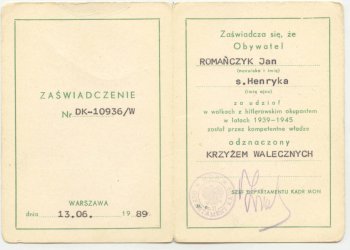
.: the Cross of Valour card
According to the order from the 9th of September 1944 I was decorated with the V Class Order of Military Virtue.
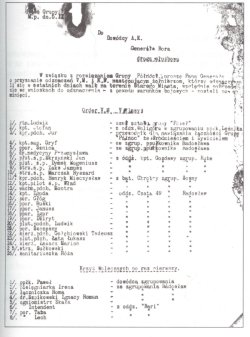
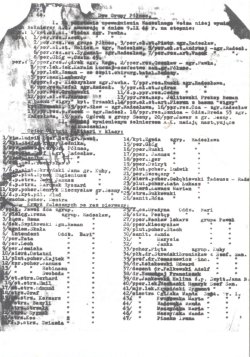
An award-giving proposal and an order of granting the Order of Military Virtue
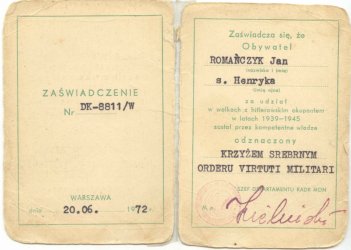
The Order of Military Virtue card
When the Uprising finished I got a promotion for the sergeant officer cadet.
In August 1948 I was decorated by the Polish Government in London with the Army Medal three times.
After the court verdict in 1949 I was degraded to the rank of private deprived of any civil rights.
In August 1959 having left the prison the Chairman of the State of the Polish People's Republic decorated me for the second time with the Cross of Valour. Up to this day I've been wondering what for I got it, for Ursus, or for other achievements in the period after the Uprising.
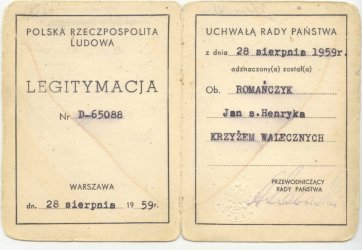
the Cross of Valour card granted by A. Zawadzki
Having received the Supreme Court verdict clearing me of accusations and punishment in 1990 I reported to WKU station to settle my register. After some time I was called to WKU and informed that according to the order of MON (= the Ministry of National Defence) number 14 from the 29.01.1991 I received a promotion from the rank of private to the rank of captain with the seniority from the 2nd of October 1944.
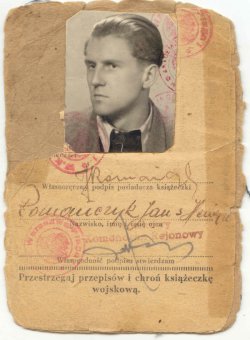
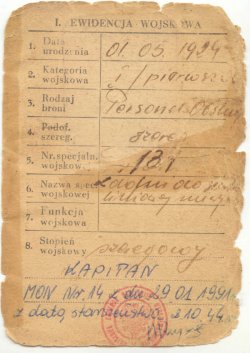
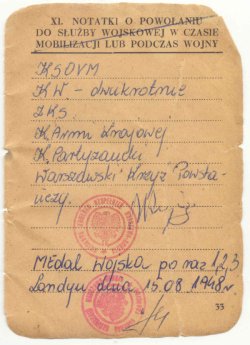
A service papers
Then I received subsequently the Silver Cross of Merit, the Cross of Home Army, the Insurgent Cross, the Warsaw Insurgent Cross.
As part of promotions of Home Army soldiers on the 23rd of April 1999 I got a promotion for the rank of major.
On the 27th of October 2000 I got a promotion for the rank of lieutenant-colonel.
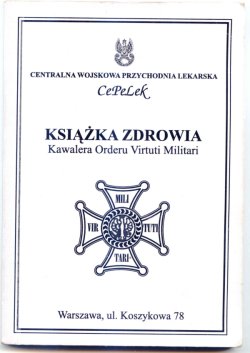
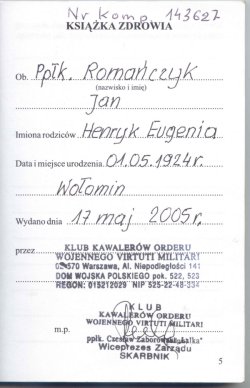
A health certificate of the Knight of the Order of Military Virtue
On the 11th of December 2006 a promotion for the rank of colonel signed by the Minister of Military Affairs, Radoslaw Sikorski.
On the 15th of June 2007 I was honoured with the Officer Cross of the Order of Polonia Restituta.
In 1991 a new authority to secure a high income to themselves and to our persecutors decided that against the Constitutional Tribunal, when the regular pension and the war-disabled person pension were coincident one of the benefits should be decreased by half. My pension was decreased by half even though when working I'd been paying a complete fee for the pension. This is the law of our authority.
Jan Romańczyk
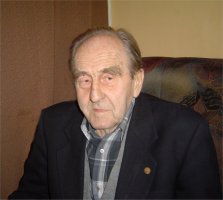
|
Jan Romanczyk
born on the 1st of May 1924 in Wolomin
sergeant cadet of Home Army
pseud. "Łukasz Łata"
Kedyw of the Main Headquarters of Home Army
"Torpeda" Platoon,
"Miotła" Battalion
"Radoslaw" Grouping
|
elaboration: Maciej Janaszek-Seydlitz
translation: Małgorzata Szyszkowska
Copyright © 2011 Maciej Janaszek-Seydlitz. All rights reserved.






















